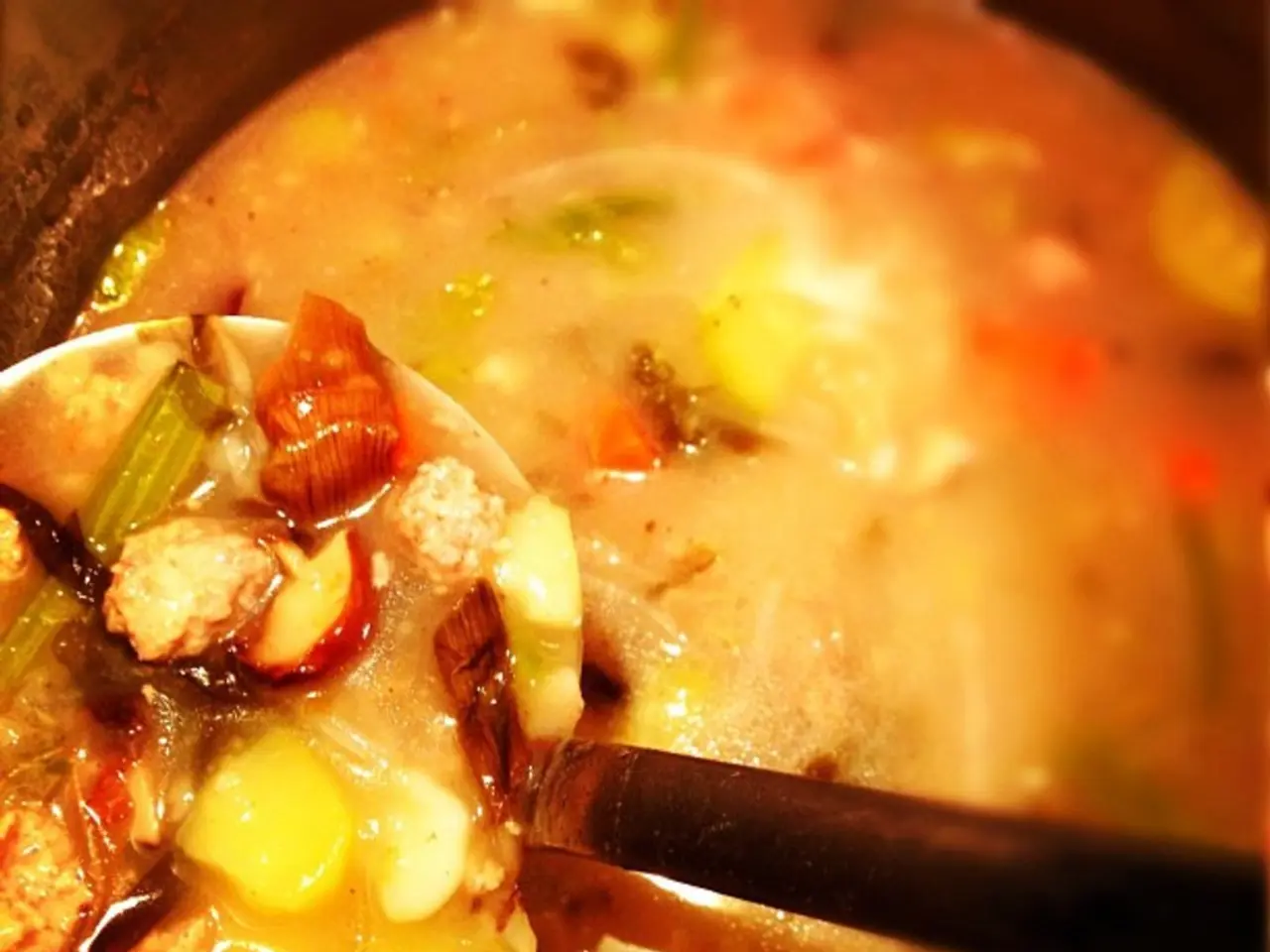Diet plans in Ayurveda: Vata, Kapha, and Pitta constitutions
In the ancient medical system of Ayurveda, diet is tailored to an individual's unique energy balance, known as their dosha. The three doshas — Vata, Pitta, and Kapha — each require different foods to maintain balance and support overall health.
Vata Dosha
Those with Vata dosha, characterised by creativity and activity, should focus on warm, nourishing foods like soups, stews, and warm grains such as oats and rice. Oily and grounding foods, such as avocados, nuts (especially soaked almonds), and ghee (clarified butter), also benefit Vata individuals. Fresh fruits like bananas, berries, and dates, as well as cooked vegetables such as green leafy vegetables, squash, carrots, and beets, are also recommended.
To maintain balance, Vata individuals should avoid cold, dry foods such as raw salads, cold foods, and dry fruits. Bitter, astringent foods can increase dryness and stress the system, so they should be minimised.
Pitta Dosha
People with Pitta dosha, known for their intelligence and temperament, have a big appetite and healthy digestion. Cooling, hydrating foods like yogurt, cucumbers, and sweet fruits such as pears and pineapples are beneficial. Pitta individuals should also focus on sweet, bitter, and astringent tastes, as these help pacify Pitta. Herbs and spices such as fennel, coriander, cilantro, and mint are also recommended.
To maintain balance, Pitta individuals should avoid heating, spicy foods such as chili peppers, hot sauces, garlic, and fermented foods. Sour and salty foods can exacerbate Pitta imbalances, so they should be minimised.
Kapha Dosha
Individuals with Kapha dosha, who tend to have immense stamina and high intelligence, should focus on light, dry foods such as roasted vegetables, whole grains, and puffed rice. Astringent and bitter tastes help balance Kapha, so these should be emphasised. Herbs and spices such as turmeric, ginger, and black pepper are also beneficial.
To maintain balance, Kapha individuals should avoid heavy, oily foods such as fried foods, rich sauces, and too much dairy. Sugary and sweet foods can exacerbate Kapha imbalances, so they should be minimised.
General Principles
Eating seasonally, mindfully, and adjusting based on individual factors such as lifestyle, climate, and health status are key principles in Ayurvedic eating. Eating slowly and intentionally, and choosing foods that are in season and locally available, promote overall wellness.
Ayurveda is not just a diet, but a medical system that emphasises the role of five elements: air, fire, water, space, and earth. It's important to remember that Ayurvedic medicine should not be used as a substitute for medical treatment, and rigid adherence to any specific diet may be triggering for people with a history of eating disorders.
Research has shown the benefits of Ayurvedic interventions for certain conditions, such as irritable bowel syndrome. A 2021 randomised controlled trial found that an Ayurvedic intervention significantly reduced symptoms [1]. Six months after a 3-month-long study of an Ayurvedic diet and yoga as a tool for weight loss, participants had lost an average of 13 pounds [2].
References: [1] Khanna, D., Khanna, P., & Dhawan, B. (2021). Ayurvedic management of irritable bowel syndrome: A systematic review and meta-analysis. Journal of Ayurveda and Integrative Medicine, 12(1), 5-16. [2] Shankar, E., & Raghuram, T. V. (2010). Effect of Panchakarma treatment on obesity: A randomized controlled study. Journal of Ayurveda and Integrative Medicine, 1(1), 1-6.
- Ayurveda's focus on diet addresses an individual's unique energy balance, with Vata, Pitta, and Kapha doshas requiring different foods for balance and overall health.
- Vata individuals, with creativity and activity, should prioritize warm, nourishing foods like soups and grains, as well as avocados, nuts, and ghee.
- Maintaining balance for Vata types, avoid cold, dry foods and reduce bitter, astringent foods.
- Pitta individuals, known for intelligence and temperament, should eat cooling, hydrating foods, such as yogurt, cucumbers, and sweet fruits.
- For balance, Pitta individuals should minimize heating, spicy foods, sour, and salty foods.
- Kapha individuals, with high intelligence and stamina, should focus on light, dry foods like roasted vegetables and whole grains, while preventing heavy, oily, and sugary foods.
- Key principles in Ayurvedic eating include eating seasonally, mindfully, and adjusting based on individual factors, promoting overall wellness.
- Ayurveda goes beyond diet, emphasizing five elements and serves as a medical system that should not replace modern medical treatment, with benefits shown for conditions like irritable bowel syndrome and weight loss.




